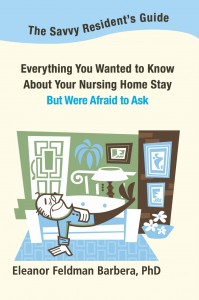Resources for Early Career Long-Term Care Psychologists
Before I started working as a psychologist in long-term care, I got some excellent training from the Alzheimer’s Association which focused on dementia care, and I took a helpful course from a practicing long-term care psychologist which reviewed typical care issues and billing concerns.
Despite this training and having worked in two psychiatric hospitals, a college counseling center, two residential treatment centers for adolescents, a high school, an outpatient clinic, a substance abuse center, managed care, and a crisis intervention center, I’d never encountered the situations I came across in the nursing home and felt at a loss at times. Below are some of the books and websites I found helpful early on, and some I wish had been available when I first began my work in long-term care. (I also took a weekend-long course in thanatology — the study of death — because it was hard to handle at first.)
Handbook of Health and Behavior: Psychological Treatment Strategies for the Nursing Home Patient, by Joseph M. Casciani, PhD — This user-friendly handbook outlines medical conditions typically seen in long-term care, common reactions to them, and treatment strategies to address them. Dr. Casciani also offers training at Concept Healthcare.
Psychotherapy with Older Adults, by Bob G. Knight, PhD — An excellent outline of psychotherapeutic issues with older adults in general, the book offers a helpful window into the emotional reactions of both therapist and patient.
Life Worth Living: How Someone You Love Can Still Enjoy LIfe in a Nursing Home, by William H. Thomas, MD — Dr. Thomas is founder of the Eden Alternative and has written extensively on transforming the culture of the nursing home. I read this book early in my career when I was wondering why so little attention was being given to the emotional environment compared to the mental health settings in which I’d worked. For more from Dr. Bill Thomas: ChangingAging.org.
Dementia Beyond Drugs: Changing the Culture of Care, by G. Allen Power, MD — Dr. Power works with the Pioneer Network and his book illustrates that the environment is contributing more to the problems nursing home residents experience than workers in most “typical” facilities realize. He outlines how to undertake a complete transformation. This book will confirm your observations as a psychologist.
Hiding the Stranger in the Mirror: A Detective’s Manual for Solving Problems Associated with Alzheimer’s Disease and Related Disorders, by Cameron J. Camp, PhD — Dr. Camp offers a host of suggestions on how to work with residents who have dementia in this engaging, easy to read volume. This will be the book you recommend to staff members (especially aides and nurses) because we as psychologists aren’t generally able to help staff with residents with dementia in the current reimbursement system.
The Savvy Resident’s Guide: Everything You Wanted to Know About Your Nursing Home Stay But Were Afraid to Ask, by Eleanor Feldman Barbera, PhD — I’d be remiss if I didn’t include my own book on the list. If you want a very practical and quick outline of resident concerns and how to handle them, as well as a resource to provide residents and families, please take a look: The Savvy Resident’s Guide.
WEBSITES for psychologists:
Psychologists in Long-Term Care — a group of dedicated professionals who share their experience and wisdom via the listserv. A must-join.
GeroCentral — The collaborative effort of a number of different psychology organizations, the website has links to all of them and to a vast number of resources. Well worth reviewing.
APA’s Resources for Psychological Practice With Older Adults and Their Caregivers — This flyer from APA’s Office on Aging provides a concise list of resources available from APA. More resources can be found at: APA Office on Aging

